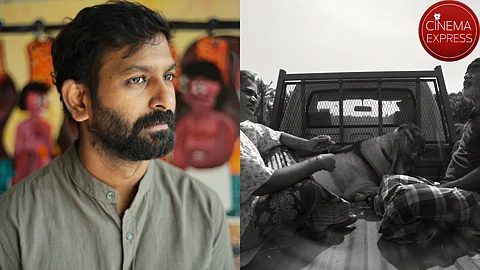

The idea behind Pride Month lies in rebellion. The first Pride march was held in June 1970, one year after the Stonewall Riots in New York. For filmmaker Ananth Subramaniam, who believes telling the stories of the underdogs is important, the recognition for his recent film, Bleat! (Kattu! in Tamil), was a shot in the arm. The film won the Queer Palm at the 2025 Cannes Film Festival. “My interest in cinema is passed down from my parents,” says Ananth, who studied architecture for his undergraduate studies in Malaysia. It was in Malaysia that he had the opportunity to make documentaries, albeit in an amateurish manner. Shifting his focus to short films proved to be a better decision. Liar Land, one of his short films, received a special mention in the Locarno Film Festival. His other short film, The House of Brick and Stone, premiered at the Fantasia Festival, which was held in Montreal, Canada.
Ananth considers Bleat! as a personal test, especially since he moved out of his comfort zone. “I was previously making films in Malay. So I wanted to see if making a film in Tamil would work for me,” says Ananth. In Bleat!, an old couple realise that their ceremonial goat, which they thought was a male, is actually pregnant. Talking about the queer elements in Bleat!, Ananth says, “There is a rigid demeanour to the couple. They represent the conservative ideals you find in parents, with the goat representing a queer child. Queerness comes with finding your identity. It is about the freedom to be who you want to be. Beyond a person’s sexual preferences, it is about a queer person’s feelings and their quest to find their place in the world. So even though we are confronted with the woes of the couple in Bleat!, the film is about the community around the couple and its reaction to the change in the gender of the goat.”
Interestingly, Ananth, who has found comfort in the short film format believes that even experienced filmmakers need to explore this space. “During the pandemic, a lot of filmmakers made short films which were compiled into an anthology, so it isn’t necessarily an amateur’s space,” says Ananth, adding, "You will discover techniques that can help elevate your story better.”
Bleat!’s journey to Cannes turned out to have a couple of firsts. It was the first short film from Malaysia to premiere at Cannes, and it was the first Tamil-language film from Malaysia to premiere at Cannes. The director excitedly shares, “Through Bleat! I was able to show the significance of Karuppusami, parai music, and the elements that go into Tamil festivals. While all of them were alien to the international audience, they were able to understand the film to the fullest.” Ananth credits the progressiveness in the Tamil diaspora for providing the space to make films like Bleat!. “I am currently making a feature film about a young girl in the punk rock scene in Malaysia, which centres around her rebellion against forced expectations. But to make a film like this, I need to have an open-minded audience. I can pursue this story, as Tamils have a culture of acceptance.”